Missouri's Controversial Execution Decision
The state of Missouri is on the brink of a highly contentious execution as it prepares to put Marcellus Williams to death on September 24, 2024. Williams, a 55-year-old death row inmate, has been at the center of a long-standing legal battle over his guilt in the 1998 murder of Lisha Gayle. The case has drawn significant public attention due to serious concerns about the lack of DNA evidence linking Williams to the crime.
This planned execution is not just controversial due to the doubts surrounding Williams's guilt but also because the St. Louis County prosecuting attorney's office, which initially secured his conviction, has sought to overturn the case. They have argued that there is insufficient DNA evidence linking Williams to the murder, an argument that has been bolstered by forensic tests conducted over the years.
The Crime and Conviction
Lisha Gayle, a former reporter for the St. Louis Post-Dispatch, was found brutally stabbed in her University City home in 1998. The initial case against Williams included a combination of physical evidence and testimony from individuals who claimed he had confessed to the crime. These witnesses included a former cellmate and Williams's then-girlfriend, whose reliability has since been called into question by his defense team.
Williams was convicted and sentenced to death in 2001. Over the years, however, questions about his guilt have persisted. Williams has consistently maintained his innocence, and his defense team has worked tirelessly to challenge the evidence used to convict him.
DNA Evidence and Legal Battles
One of the most significant factors contributing to the uncertainty surrounding Williams's conviction is the lack of DNA evidence tying him to the crime scene. DNA testing on the knife used to kill Gayle found no traces of Williams's DNA, raising serious doubts about his involvement. In light of this, Williams's execution has been halted twice before for additional DNA testing – first in 2015 and again in 2017.
The Missouri Attorney General's office, led by Republican Andrew Bailey, has nonetheless pushed forward with the execution. They have pointed to other pieces of evidence, including the testimonies mentioned earlier, to argue that Williams is guilty. However, this approach has faced strong opposition from various quarters.
Prosecutors and Family Seek Clemency
One of the most striking aspects of this case is the support Williams has from the prosecuting attorney's office that originally convicted him. The St. Louis County prosecuting attorney's office has called for the case to be re-examined and the execution halted. They have emphasized that the absence of DNA evidence is too significant to ignore and that it raises legitimate concerns about wrongful conviction.
The victim's family has also joined the call for clemency. Despite their loss, they have expressed concerns about executing someone who may be innocent. This stand taken by the family is particularly moving and underscores the gravity of the doubts surrounding Williams's guilt.
Governor's Stand and Legal Exhaustion
Despite these objections, Missouri Governor Mike Parson has defended the decision to proceed with the execution. Parson has argued that Williams's legal team has deliberately muddied the waters regarding DNA evidence and that the defendant has exhausted all available legal avenues. This stance seems to align with the views of the attorney general's office, which remains resolute in its conviction to move forward.
Parson's position has drawn criticism from various human rights groups and legal experts who argue that the presence of any doubt regarding a defendant's guilt should be enough to spare them from the death penalty.
Public Outcry and Defense Team's Efforts
The case has garnered extensive media coverage and public outcry, with many citizens and advocacy groups rallying against the impending execution. Williams's defense attorney, Jonathan Potts, has stated that the overwhelming public opinion, along with the victim's family's stance and the prosecuting attorney's office's objections, makes the push for execution even more alarming.
Potts has emphasized the unreliability of the testimonies used to convict Williams, pointing out inconsistencies and the motivations of the witnesses who testified against him. He has also highlighted the need for a justice system that does not execute individuals when there is considerable doubt about their guilt.
Conclusion: A Controversial Path Ahead
As the scheduled execution date approaches, the case of Marcellus Williams continues to raise serious questions about the administration of justice. The lack of DNA evidence, combined with the support for clemency from prosecutors and the victim's family, presents a compelling argument against moving forward with the death penalty.
This controversy lays bare the complexities and potential fallibilities of the criminal justice system, particularly in cases involving the ultimate punishment. The debate over Williams's execution is not just about one man's fate but also about the broader implications for justice and human rights in America.

